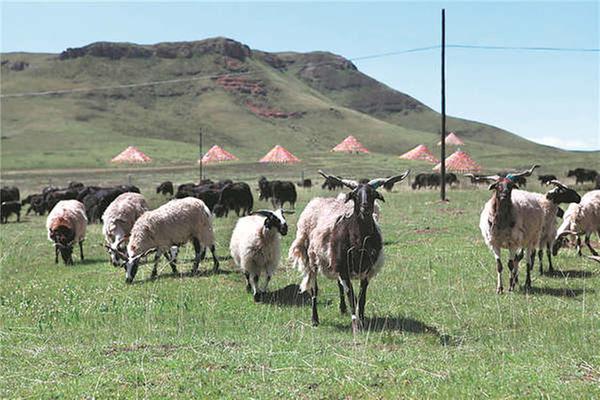New horizon

 |
| Cattle graze on the grassland in Gaxiu village. [Photo by Xing Yi/China Daily] |
It takes two hours by road from Xiahe to reach Luqu. Gahai Lake, which lies in the southern part of Luqu, is the largest fresh water body in Gannan, covering 1,000 hectares at an altitude of 3,480 meters above sea level. On the way to the lake, via national highway No 213, once can see the Gaxiu village of Gahai township.
The first batch of nearly 100 nomads settled in this village in 2003, and now it is home to some 1,800 people, Soknub Dondrub, a local official, says.
Soknub Dondrub spent his college life at the Minzu University of China in Beijing, from 2004 to 2009. Back then, he was fond of the various cafes and bars in the capital, so when he became the head of Gahai township two years ago, he helped to build local guesthouses with different themes.
There are hostels with bunk beds for the young, guesthouses with yards catering to family travelers and tents for outdoor enthusiasts. In the youth hostel, a cafe bar offers milk tea and barley liquor, and a bed costs 18 yuan per night.
The village founded a company to run all the facilities to avoid a price war, and shares the profits among the villagers.
In 2016, the 20 guesthouses received 2,400 visitors, and they accommodated around 600 visitors earlier this month.
The village opened its own museum in May, showing with pictures and artifacts how nomads settled in this place.
The company sells local goods, such as caterpillar fungus, on e-commerce marketplaces like Zangbooo, featuring everything Tibetan.
The villagers still keep sheep and yaks-some 50,000 cattle, but they are testing out a smart grazing system with China Telecom. Each animal will be made to wear a band that has a position-monitoring component so that the herdsmen can see their cattle on computer screens and avoid frequent visits to the grazing pastures several kilometers away.
"In the olden days, my work was dealing with yaks and sheep, and now I deal with people every day," says Chopa Kyab, who works at the company. "But I like it."

































